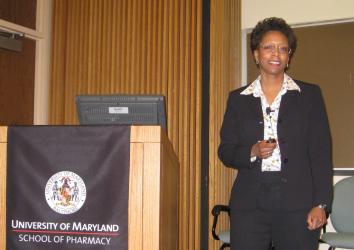Pharmacy Dean’s State of the School Address Charts Course to Excellence
Creating cultures of scholarship, philanthropy will make School preeminent, Eddington says

By Jeffrey Raymond
February 8, 2008
By helping to educate the pharmacist of tomorrow – a professional whom patients see not as a pill counter but as an engaged partner in their health care – the University of Maryland School of Pharmacy will build on its reputation for excellence, said Dean Natalie D. Eddington, PhD, in her State of the School address.
“I think the pharmacist can play a significant role in allowing direct patient care,” Eddington told dozens of faculty and staff at the Jan. 31 speech. “That is the way we will be excellent, that we will be preeminent.”
It was the first State of the School address for Eddington, who was promoted to the post last summer. She was previously chair of the School’s Department of Pharmaceutical Sciences.
Preparing pharmacists to give flu shots and to counsel patients with diabetes are examples of how the School is already providing leadership in helping to transform the industry. But the process will require even more work, including implementation of new learning paradigms that make better use of the latest technology. Toward that end, Eddington wants a new endowed faculty chair in instructional design and technology to help lead the School’s transformation.
The dean also took time in her speech to provide an update on the long-sought Pharmacy Hall addition. The $62 million building would rise seven floors next to the north wall of Pharmacy Hall, and be connected by a glass atrium nearly as tall as the two buildings. The addition would allow the School to dramatically expand its classroom, lab, office, and practice facilities-expansion that is sorely needed given the School’s recent enrollment increases, and its plans to enroll even more students and hire more faculty members.
Eddington repeated her desire to bolster a sense of collegiality and collaboration within the School, but also called for collaboration beyond the School. Specifically, she said she wants to expand practice sites for PharmD students at the University of Maryland Medical Center, and merge the School’s residency program with the hospital.
The bottom line, she said, is building a “culture of scholarship” that would open opportunities for students and faculty.
But excellence and innovation cost money. With tuition and government support covering only a fraction of the costs, Eddington said the School also needs to work on a “culture of philanthropy” to become more financially self-sustaining.
“I need everyone to be a committed, enthusiastic advocate for the School of Pharmacy,” said Eddington in concluding her address. “If you are, we can do wonders.”
